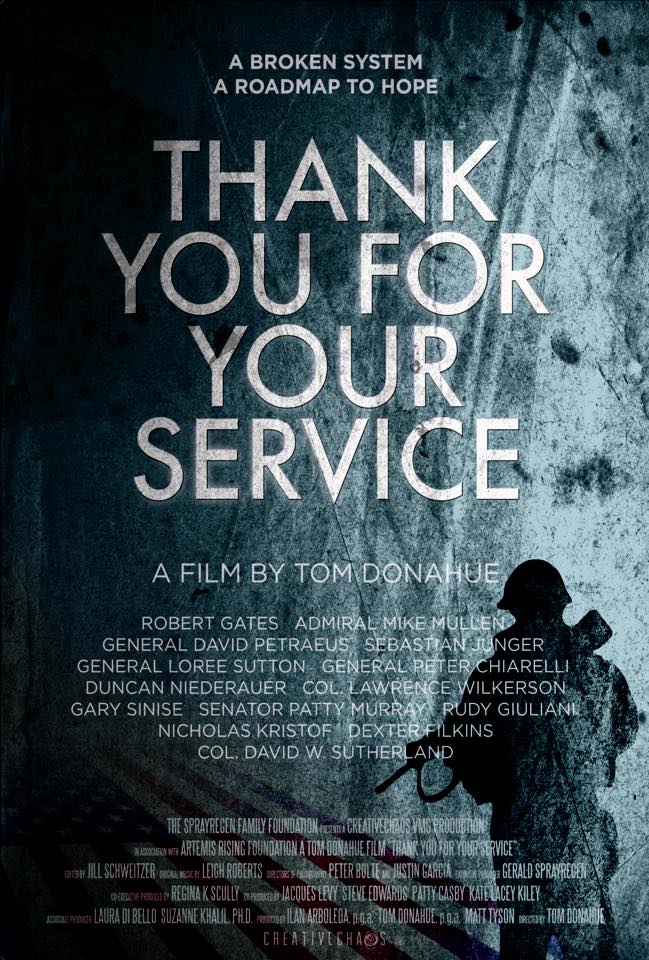Title: Thank You For Your Service
Director: Tom Donahue
Genre: Documentary
The U.S. military faces a mental health crisis of historic proportions. Only in recent years have people started to take action to treat Post Traumatic Stress Disorder.
Director Tom Donahue addresses this issue with sagacity, sensibility and depth. ‘Thank You for Your Service’ takes aim at our superficial understanding of war trauma and the failed policies that result, through a documentary that interweaves the stories of four Iraq War veterans with candid interviews of top military and civilian leaders.
Tom Donahue directed HBO’s ‘Casting By’ which was nominated for an Emmy in 2014, and was hailed as one of the top five documentary films of 2013 by the National Board of Review. Prior to that, in 2008, Donahue’s ‘Guest of Cindy Sherman’ premiered at Tribeca Film Festival to rave reviews and land on the Sundance Channel the following year.
With ‘Thank You for Your Service’ Tom Donahue maintains his enthralling and compelling storytelling, to denounce systemic neglect, propounding significant internal change.
In this Exclusive Interview he shares the making of ‘Thank You For Your Service’:
How did you find out that more people die from suicide than combat?
I first heard about this from a 2012 article in Time Magazine. My biggest inspiration was an op-ed by Nicholas Kristof in the New York Times in 2012 called A Veteran’s Death, A Nations Shame. Kristof wrote: “For every soldier killed on the battlefield this year, about 25 veterans are dying by their own hands.” I decided to open the film with this quote.
How personal was this issue to you?
The film was very personal for me. My father and most of my older relatives were Army veterans. And my best friend committed suicide when he was 21 years old, in his dorm room in college. So the issue of suicide was close to me.
What were the most astonishing revelations you discovered during your interviews with the veterans and the mental health experts?
The biggest revelation for me was the neglect of the issue within the Department of Defense and the military itself. Mental health issues were not discussed at all in the war planning stage, and were not initially addressed to any significant degree in the first years of the wars. I was also surprised by the lack of coordination and communication between the various behavioral health specialist divisions within the military itself. There is no standardized method of treatment between psychiatrists, psychologists and social workers. And they do not really talk to each other. As a result, there is a lot of redundancy and waste and a lot of the people who need help do not get any. Consequently, it will happen again when the next wars break out.
What were the major challenges in the making of the movie?
Ironically, I was told the first challenge would be to get any veterans to speak honestly and candidly about their experiences in the war. Surprisingly, I found this was not the case. If you ask with respect and really seem to care about their stories, they are very much willing to talk, especially if their stories can in any way help other veterans.
Was it difficult to have the interviewed politicians criticize the neglect of the United States Military towards mental health care?
No. Those I interviewed were willing to be very candid and open about the problems, even if they did not fully understand the systemic reasons that caused them. Certainly, there were many who were not willing to go on camera to discuss the issue, but I was heartened by the number of those who did.
Do you think cinema can be influential in triggering the government to establish a Behavioral Health Corps, as a division of the Department of Defense?
Yes, I believe that cinema can be very influential in helping to bring about an organizational change in the military, like a Behavioral Health Corps. I believe very strongly in the power of documentary filmmaking to affect change. I’ve seen it happen previously with one of my own films.
Please help us make change by going to our website, bhcnow.com. We will keep you updated on future screenings of the film, besides what’s happened legislatively and ways you can help.
Written by: Chiara Spagnoli Gabardi

